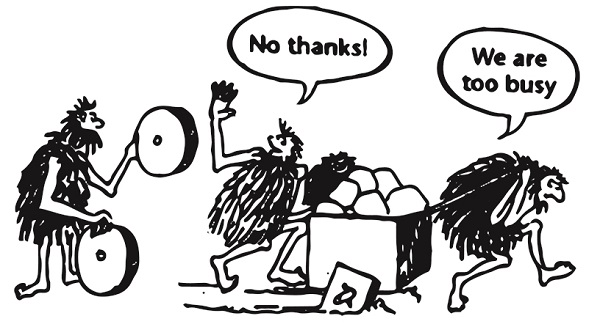
Quick! We have to stop this twit!
Let's Adore Jesus-Eucharist! | Home >> Philosophy

Quick! We have to stop this twit!
Imagine the inventor of the wheel, trying to build the first wheel in the history of mankind. What would have happened if, each time he had tried to start working, some twit had interrupted him by saying: "But why are you wasting your time with those big pizza-shaped pieces of wood? All you need to do is to push on the mammoth you've just killed, to bring him home! Are you too lazy to push? Or too stupid to know the way back to your cave?"
Even if our inventor had patiently taken the time to explain to this twit the concepts of friction, of rolling and of energy efficiency, another twit could have arrived just after, and he too prevented him from working. At worst, with enough twits, the wheel never would have been invented!
At some point of time, for civilization to develop, the twits have to be stopped.

The wheel has been invented, and we no longer live in caves. Nevertheless, even today, we must deal with serious problems. Think about pollution, war in the Middle East, abortion, the national debt, etc. Fortunately, even today there are intelligent and hard-working inventors who struggle to solve these problems. Unfortunately, there are also twits who get in the way of the productive workflow.
How do twits harm progress? Generally, they make no effort to learn. They hurry up and condemn what others do, without having even the faintest idea of what they are talking about.
The inventor of the wheel was lucky: if too many twits bothered him, he could simply go back to his cave and work in solitude. Unfortunately, the problems we have today can rarely be solved by a single person. Often, on the contrary, they require a long and delicate intellectual collaboration between groups of people who don't have a natural tendency to get along. The negative effect of twits is hence multiplied.
As a programmer, I think I could write a computer program able to detect e-mails sent by twits. (The basic idea is not complicated since, in a way, this little text on the "TwitStop" is the negative image of: "The Critical Traffic Light".) The software would just have to scan the incoming e-mail and calculate typical twit heuristics:
3.1) "Write Time to Reply Time" ratio. The program would calculate how long my initial e-mail is, and estimate how long I took to write it. It would then look at the timestamps on my initial e-mail and the response I got. If a person replies in far less time than what I took to write my e-mail, chances are that person didn't even read carefully what I wrote.
3.2) "Interspersed Regurgitation". It is very difficult to accurately answer somebody's e-mail, if you don't often quote it. Answering an e-mail, by definition, means you are providing answers to questions. The software can't figure this out (it's not intelligent), but it can use the features of file comparaison programs like "diff" and calculate how many snippets of the original e-mail are interspersed inside the reply. For example, if 30% of the original e-mail is present in the reply, that means the person: (a) probably read the original e-mail; and (b) took the time to remove 70% of the initial e-mail which wasn't necessary for the reply, but kept the 30% that would be used as "questions" to which the reply provides answers. If the original e-mail is not even quoted, or if it's just packed as a big blob at the bottom of the reply, chances are the original e-mail was not carefully read.
3.3) "Click-Throughs". The software program would just count the number of hyperlinks in the orginal e-mail, then download those referenced pages and compare their contents to the e-mail reply. If the reply doesn't quote anything from the referenced pages, that means the person probably didn't click on those links, or at least didn't read the referenced texts even a little bit.
3.4) Paragraph Length. Long paragraphs in an e-mail reply often indicate that the writer is rambling. The more you listen to the voices inside your head, instead of reading the e-mail that was sent to you, the longer your paragraphs will tend to be.
3.5) Typos and other clues of haste. Typos, Engish mistakes, several e-mails sent in quick succession, etc., are all clues that the author was in too much of a hurry to think carefully. Moreover, the less an author finds it important to check what he has written, the higher the probability that he's blinded by pride.
Etc., etc...
(Speaking of bad e-mails, see also How To Write A Good E-Mail)
I'd love to be able to invent a way to make everybody intelligent! (I'd be the first to take a large dose of my invention!) The best I can offer is the "TwitStop". The idea is that each problem has a kind of lower limit of knowledge, below which it's impossible to intelligently participate in the discussion. Since knowledge is transmitted by words, we can calculate a "twitstop" for each problem to be solved. For example, we can say that such a problem has a TS5000, i.e. a 5000-word text that you must absolutely read, before opening your mouth. (This is also partially the idea behind a "FAQ" or "Frequently Asked Questions", when they are well made.)
Of course, the twitstop isn't magical. For it to work, it is necessary that:
4.1) The number of words must be a minimum. For example, the definition of essential terms, an overview of "solutions" that have already been attempted and which didn't work, references to additional sources of information, etc.
4.2) The text must as far as possible be a consensus. In my opinion, even in the most difficult cases, it's always possible to find at least some things in common. (See for example "Abortion: Have We Done Our Homework?")
4.3) Twits who don't read it carefully must be stopped. If needs be, a small exam should be successfully passed to be able to access the discussion.
Etc., etc.
Hum, I wonder which TwitStops I should have read, before writing this article...
Let's Adore Jesus-Eucharist! | Home >> Philosophy